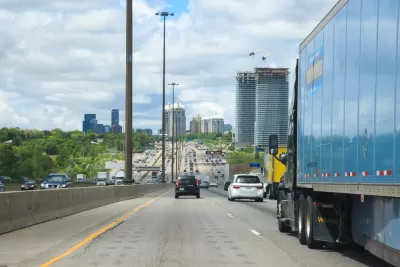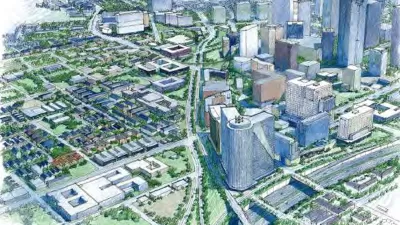Highway removal can improve the air quality and health of the immediate environment, but displacement and gentrification threaten to exclude former residents from the benefits.

The redesign of Oakland's Mandela Parkway has been heralded as an "appropriate, if partial, amends for the devastation wrought on low-income neighborhoods by the freeway-building boom of earlier decades." The full story reveals Sarah Digiulio, is more complicated. "Although the 1.3-mile strip of land that Mandela Parkway passes through has cleaner air and better amenities than when it was a freeway spur, many of the neighborhood’s original residents are no longer there to enjoy it, forced out by rising rents and housing costs. And West Oakland more broadly, bordered by the massive Port of Oakland, is still crisscrossed by elevated freeways where cars and heavy trucks spew hundreds of tons of pollutants every year."
The "new urban renewal movement" brought on by highway removal advocates faces its own challenges. "The effects of neighborhood 'greening' can be paradoxical, leading to 'green gentrification'" and displacement of its own.
"'Green gentrification' is a paradoxical effect of projects intended to support healthier communities, said Jennifer Wolch, a professor of city and regional planning at UC-Berkeley. Her research, focused on the overall public health effects of urban greening, shows that rising housing costs and displacement of longtime residents can also damage their health. Other research has found that residents from marginalized groups reported a lower sense of community after 'greening' transformations."
According to Dr. Richard Jackson, professor emeritus at the Fielding School of Public Health at UCLA and former director of the National Center for Environmental Health at the Centers for Disease Control and Prevention, "Highway removal and neighborhood renewal should focus on making communities less car-dependent, and adding affordable housing and other amenities." Community land trusts are another useful tool for maintaining affordability and community control.
FULL STORY: Can Biden’s Plan to Remove Urban Highways Improve the Health of American Cities?

Maui's Vacation Rental Debate Turns Ugly
Verbal attacks, misinformation campaigns and fistfights plague a high-stakes debate to convert thousands of vacation rentals into long-term housing.

Planetizen Federal Action Tracker
A weekly monitor of how Trump’s orders and actions are impacting planners and planning in America.

In Urban Planning, AI Prompting Could be the New Design Thinking
Creativity has long been key to great urban design. What if we see AI as our new creative partner?

King County Supportive Housing Program Offers Hope for Unhoused Residents
The county is taking a ‘Housing First’ approach that prioritizes getting people into housing, then offering wraparound supportive services.

Researchers Use AI to Get Clearer Picture of US Housing
Analysts are using artificial intelligence to supercharge their research by allowing them to comb through data faster. Though these AI tools can be error prone, they save time and housing researchers are optimistic about the future.

Making Shared Micromobility More Inclusive
Cities and shared mobility system operators can do more to include people with disabilities in planning and operations, per a new report.
Urban Design for Planners 1: Software Tools
This six-course series explores essential urban design concepts using open source software and equips planners with the tools they need to participate fully in the urban design process.
Planning for Universal Design
Learn the tools for implementing Universal Design in planning regulations.
planning NEXT
Appalachian Highlands Housing Partners
Mpact (founded as Rail~Volution)
City of Camden Redevelopment Agency
City of Astoria
City of Portland
City of Laramie





























